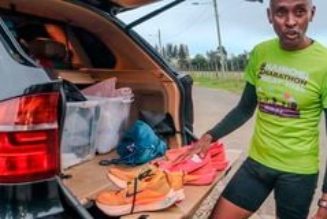Columnists
Let’s celebrate innovators working to close the refugees’ energy gap
Tuesday June 20 2023
Brian Onyango, founder of Usafi Green Energy Limited with a silver bora cook stove made from disposed drums. FILE PHOTO | POOL
Every day across the Global South businesses and non-profits are using mini-grids and rooftop solar to bring clean energy to more and more communities – while safer cookstoves tackle deforestation and air pollution.
But too often, barriers stop the spread of these services and products to displaced people. We risk a widening energy poverty gap, further adding to the challenges faced by some of the world’s most marginalised communities.
On this World Refugee Day, it’s time to ask – how can this gap be closed? A key step is supporting and replicating homegrown energy initiatives, and the entrepreneurs and community organisations driving ground-up change.
They know the solutions needed, and the funding and business models that can make them a reality.
Backing this work is much-needed action towards a more inclusive, participatory, sustainable humanitarian system. Whether powering clinics, streetlights, water pumps or market stalls, energy is at the centre of a strong community.
Ensuring that energy systems are locally owned – or run hand-in-hand with local people – is a foundation for resilience. And, crucially, it helps bring dignity back to communities, something many other interventions cannot manage.
Examples of truly homegrown innovation include USAFI Green – a refugee-led enterprise in Kenya’s Kakuma Refugee Camp, employing local people to manufacture cookstoves (2,000 a month) and clean-burning briquettes to fuel them.
Ninety-five percent of its staff are under 35, meaning a big impact in tackling youth unemployment. Contracts to supply briquettes to the FAO have supported USAFI Green’s growth, underlining the importance of partnerships between local and global organisations.
In East Africa, Save the Environment Ethiopia has launched twelve clean energy co-operatives in partnership with UNHCR, local authorities and funder IKEA Foundation.
Local people are given training in engineering and business skills. This supports a range of livelihoods, from farming to gum and incense making.
Supporting entrepreneurship is particularly important because of the barriers to work facing refugees and displaced people.
Naushad is a programme officer at Ashden while Alkayed is the co-founder and chairperson of the Global Refugee-Led Network.









